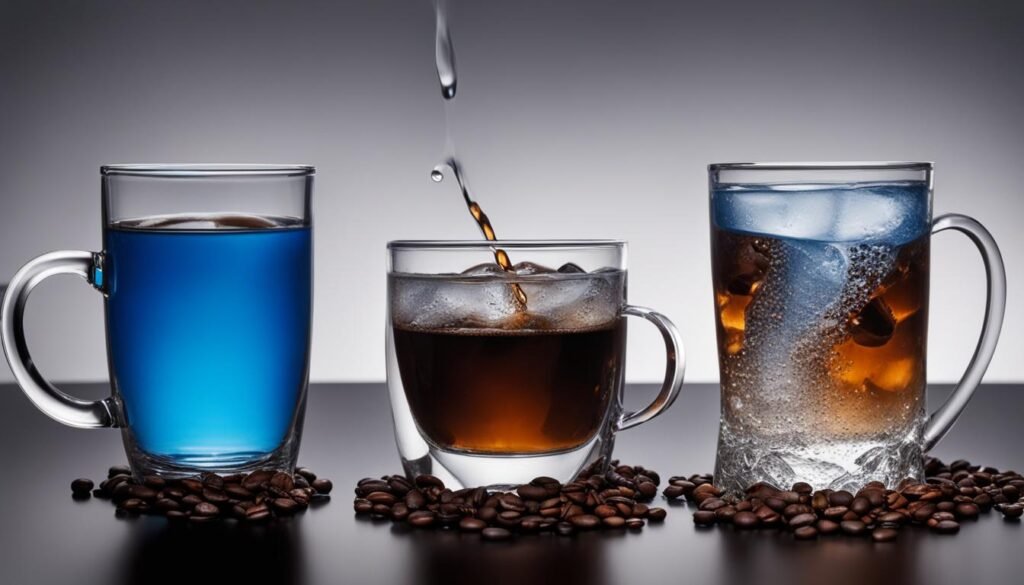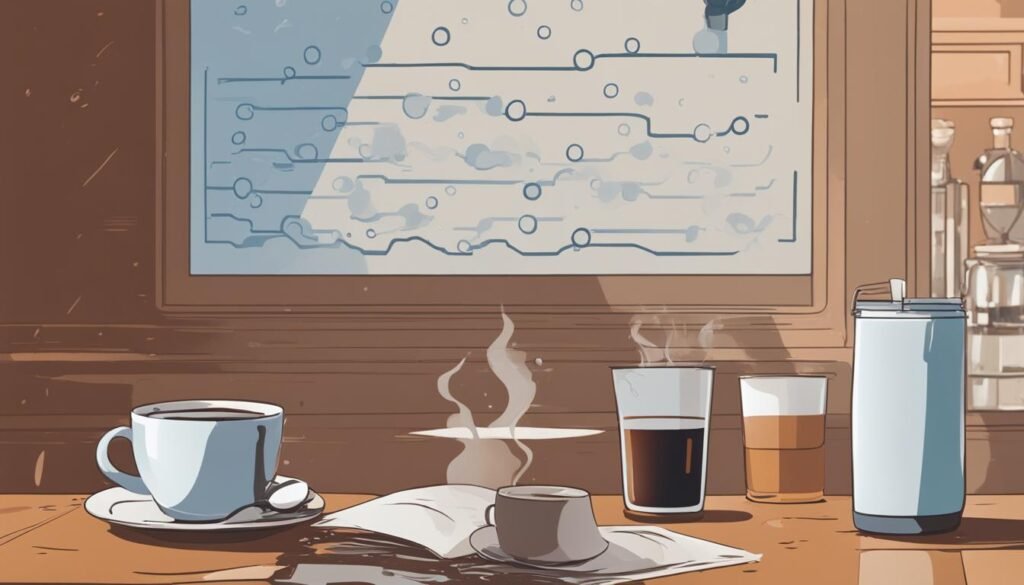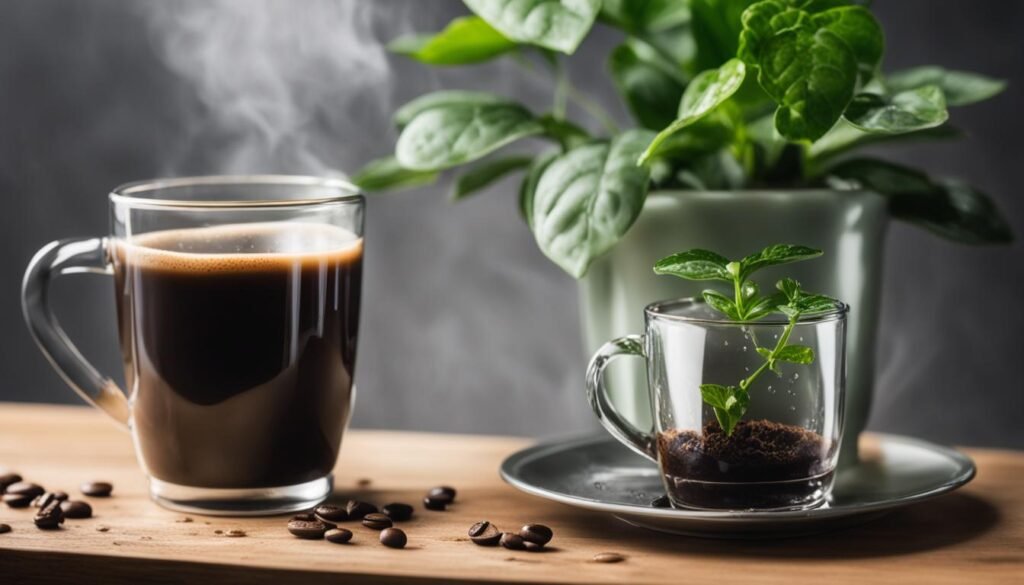Coffee is a popular beverage consumed by millions of people daily. Many wonder if it can be considered a source of hydration or if it actually dehydrates the body. According to experts, both tea and coffee do count towards your daily water intake. They are made with water and the caffeine content in them does not have any significant dehydrating effects.
Key Takeaways:
- Coffee can count towards your daily fluid intake.
- Both tea and coffee are made with water.
- The caffeine content in coffee does not have significant dehydrating effects.
- Water is still the best choice for hydration.
- Monitor your hydration levels and consult with a healthcare professional for personalized advice.
Importance of Hydration
When it comes to maintaining good health, hydration plays a vital role. Our bodies rely on water for numerous functions, and staying properly hydrated is essential for overall well-being. But what about coffee? Can it be considered a source of hydration? Let’s explore the benefits of drinking coffee and its role in keeping us hydrated.
Coffee as a Source of Hydration
While water is undoubtedly the best choice for hydration, studies suggest that coffee can also contribute to our daily fluid intake. Coffee is made with water, and although it contains caffeine, its diuretic effects are minimal for most people. This means that the slight increase in urine production caused by caffeine is unlikely to dehydrate us significantly.
Additional Benefits of Drinking Coffee
Aside from being a potential source of hydration, coffee offers other health benefits as well. Studies have shown that moderate coffee consumption may reduce the risk of certain diseases, such as Parkinson’s disease, type 2 diabetes, and certain types of cancer. Coffee is also rich in antioxidants, which can help protect our cells from damage caused by harmful free radicals.
While it’s important not to rely solely on coffee for hydration, incorporating it into our fluid intake can be a healthy choice. However, it’s crucial to note that excessive coffee consumption or the addition of sugar and cream may negate some of the potential health benefits. As always, moderation is key.
Understanding Caffeine Content

When it comes to assessing the impact of coffee on hydration, understanding its caffeine content is key. Coffee contains caffeine, which is a natural stimulant. While caffeine is a mild diuretic, meaning it can increase urine production, its diuretic effect is generally minimal for most individuals. The amount of caffeine in coffee can vary depending on factors such as the type of coffee and the brewing method.
However, it’s important to note that the diuretic effect of caffeine doesn’t negate the hydrating effects of coffee. While coffee may not be as hydrating as water, it still contributes to your daily fluid intake. Drinking a cup of coffee can provide hydration, especially if you consider the water content in the brewed coffee itself.
So, does caffeine dehydrate you? The answer is no, not significantly. While caffeine may have a mild diuretic effect, it doesn’t lead to significant dehydration when consumed in moderate amounts. In fact, research suggests that regular coffee consumption can contribute to overall hydration status.
It’s worth mentioning that individual responses to caffeine can vary. Some people may be more sensitive to the diuretic effects of caffeine than others. It’s important to listen to your body and adjust your fluid intake accordingly. If you find that coffee makes you feel excessively thirsty or affects your hydration levels, it may be best to reduce your consumption or consult with a healthcare professional for personalized advice.
Other Sources of Hydration
While coffee can contribute to your daily fluid intake, it is important to remember that there are other sources of hydration as well. Fruits and vegetables contain high water content and can help keep you hydrated. Foods like watermelon, oranges, grapes, and cucumbers are excellent sources of both water and nutrients. Additionally, milk, juices, and sports drinks can also provide hydration.
It’s no secret that coffee is a popular choice for many people when it comes to getting their daily dose of caffeine. But did you know that coffee also contains water? While the exact amount of water in coffee can vary depending on the brewing method and type of coffee used, it is estimated that a cup of brewed coffee contains about 98% water. This means that drinking coffee can contribute to your overall fluid intake and help keep you hydrated.
However, it’s important to note that coffee should not be the sole source of your hydration. While coffee does provide water, it also contains caffeine, which can have a diuretic effect and increase urine production. This means that excessive coffee consumption without enough additional fluid intake may lead to mild dehydration. Therefore, it is recommended to balance your coffee intake with other sources of hydration, such as water, fruits, and vegetables.
Hydration Myths About Coffee and Fluid Intake

When it comes to hydration, there are often misconceptions surrounding coffee and its impact on fluid intake. Let’s debunk some common hydration myths and explore how coffee fits into the overall picture of staying hydrated.
Myth: Coffee Is Dehydrating
Contrary to popular belief, coffee does not have a significant dehydrating effect. While caffeine is a mild diuretic, meaning it can increase urine production, the diuretic effect is minimal for most people. In fact, the water content in coffee contributes to your overall fluid intake.
Understanding Fluid Intake
While water is the best choice for hydration, it’s important to consider other sources as well. Coffee can count towards your daily fluid intake, but it shouldn’t be the sole source. Fruits and vegetables with high water content, such as watermelon and cucumbers, are excellent options for staying hydrated. The key is to have a balanced approach and include a variety of hydrating foods and beverages in your diet.
Personalized Hydration Needs
Hydration needs can vary depending on factors such as age, activity level, and environmental conditions. Children and athletes, in particular, have specific hydration requirements. The American Academy of Pediatrics recommends that children drink plenty of fluids before and during physical activity. Athletes need to take precautions to avoid dehydration and should follow personalized hydration guidelines.
Signs of Dehydration

Dehydration is a condition that occurs when your body doesn’t have enough water to carry out its normal functions. It can happen for various reasons, including not drinking enough fluids, excessive sweating, vomiting, or diarrhea. Recognizing the signs of dehydration is important so that you can take steps to rehydrate and prevent further complications.
One common myth is that drinking coffee can dehydrate you. While coffee does contain caffeine, which is a mild diuretic, it does not have a significant dehydrating effect. In fact, studies have shown that coffee can contribute to your daily fluid intake and does not cause dehydration. However, it is important to note that excessive consumption of coffee or other caffeinated beverages can have a diuretic effect and may increase urine production.
So how can you tell if you’re dehydrated? One of the easiest ways is to check the color and volume of your urine. If you are well-hydrated, your urine will be light in color and you will urinate every two to four hours. On the other hand, if you experience infrequent urination and your urine is dark in color, it may be a sign that you are dehydrated. Other signs of dehydration include thirst, dry mouth, fatigue, dizziness, and dry skin.
Staying Hydrated
To stay properly hydrated, it is important to drink an adequate amount of water throughout the day. The general recommendation is to drink at least eight cups (64 ounces) of water per day, but individual fluid needs can vary depending on factors such as age, activity level, and climate. In addition to water, you can also include other hydrating beverages like herbal tea, fruit-infused water, and electrolyte-rich sports drinks in your daily fluid intake.
Remember, staying hydrated is essential for overall health and well-being. It helps regulate body temperature, supports organ function, aids digestion, and keeps your skin looking healthy. While coffee can contribute to your fluid intake, it is important to maintain a balanced approach to hydration and consume a variety of beverages and foods that contain high water content.
The Benefits of Drinking Water

Water is an essential part of our lives, providing numerous health benefits that help us stay hydrated and maintain optimal bodily functions. Unlike other beverages, water has no sugar or calories, making it a healthy choice for quenching our thirst. Drinking an adequate amount of water throughout the day can have a positive impact on our overall well-being.
One of the key benefits of drinking water is its ability to flush out toxins from our bodies. By staying hydrated, we support the proper functioning of our kidneys, which are responsible for filtering waste and toxins. Water helps to dilute and eliminate these harmful substances, promoting better kidney health and reducing the risk of urinary tract infections.
Additionally, water plays a vital role in regulating our body temperature. When we engage in physical activity or are exposed to hot weather, we sweat to cool down. Sweating is the body’s natural way of releasing heat, and it requires an adequate supply of water to replenish the lost fluids. By staying hydrated, we can better regulate our body temperature and avoid overheating or heat-related illnesses.
How can you tell if you’re dehydrated?
Dehydration can have various symptoms that indicate a lack of sufficient water in our bodies. Some common signs of dehydration include feeling thirsty, having a dry mouth, dark-colored urine, tiredness, and dizziness. If you experience any of these symptoms, it’s important to drink water to restore the body’s hydration levels.
By making a habit of drinking enough water each day, we can support our overall health and well-being. Water is essential for proper digestion, nutrient absorption, and the maintenance of healthy skin. It also helps to lubricate our joints, protect our organs, and promote healthy weight management.
In conclusion, while coffee and other beverages can contribute to hydration, nothing beats the benefits of drinking water. Water is a natural and healthy choice that provides essential minerals without any added sugars or calories. It helps to flush out toxins, regulate body temperature, support organ function, and improve our overall mental and physical capacity. So, let’s make it a priority to drink enough water every day to keep our bodies properly hydrated and functioning at their best!
Conclusion
In conclusion, coffee can be a part of your daily fluid intake and contribute to hydration. While it may not have the same hydrating effects as water, the caffeine content in coffee does not significantly dehydrate the body. It is important, however, to maintain a balanced approach to hydration and include a variety of sources in your diet.
Water remains the best choice for staying hydrated, as it has no sugar, no calories, and contains essential minerals that our bodies need. It helps regulate body temperature, flush out toxins, and support organ function. Therefore, we should prioritize water as our main source of hydration.
Remember to monitor your hydration levels by checking the color and volume of your urine. If you are urinating regularly and your urine is light-colored, you are likely well-hydrated. If you experience infrequent urination and dark-colored urine, you may need to increase your fluid intake.
Consulting with a healthcare professional can provide personalized advice on hydration and guide you in making the best choices for your body. Keeping a diverse range of fluids in your diet, including water, fruits, and vegetables, will help ensure optimal hydration and overall well-being.
FAQ
Does coffee count as water?
Yes, both tea and coffee count towards your daily water intake. They are made with water and the caffeine content in them does not have any significant dehydrating effects.
What are the benefits of drinking water?
Water has no sugar, no calories, and contains essential minerals that our bodies need to function properly. It helps flush out toxins, regulate body temperature, support organ function, and improve overall mental and physical capacity.
Does caffeine dehydrate you?
While caffeine is a mild diuretic, meaning it can increase urine production, the diuretic effect is fairly low in most people. The caffeine content in coffee does not have significant dehydrating effects.
How much water is in coffee?
Coffee is made with water, so it contains a significant amount of water. However, water is still the best choice for hydration.
Are there other sources of hydration besides coffee?
Yes, fruits and vegetables contain high water content and can help keep you hydrated. Foods like watermelon, oranges, grapes, and cucumbers are excellent sources of both water and nutrients. Additionally, milk, juices, and sports drinks can also provide hydration.
How can you tell if you’re dehydrated?
Dehydration can have various symptoms such as tiredness, moodiness, headaches, and decreased urine output. It is important to monitor your hydration levels by checking the color and volume of your urine.
What are the hydration needs for different age groups?
The American Academy of Pediatrics recommends that children drink plenty of fluids before and during physical activity. Athletes need to take precautions to avoid dehydration and should follow specific hydration guidelines based on their age, activity level, and environmental factors.
Is coffee the best choice for hydration?
While coffee can contribute to your daily fluid intake, it is important to maintain a balanced approach to hydration and include a variety of sources such as water, fruits, and vegetables in your diet.

Leave a Reply